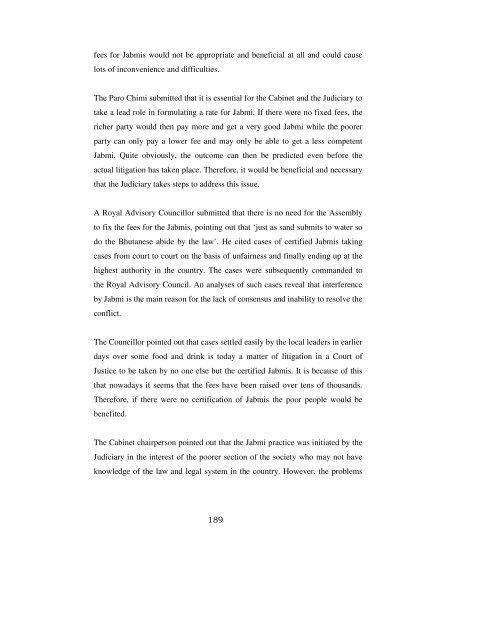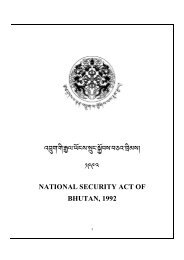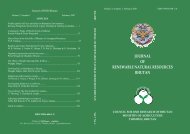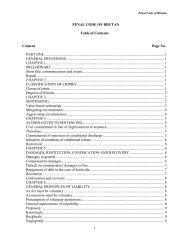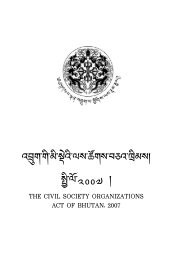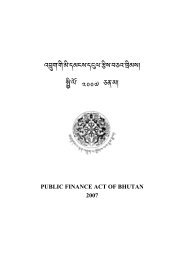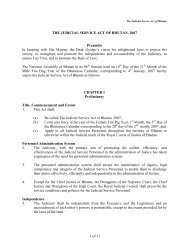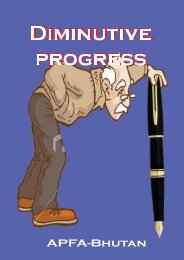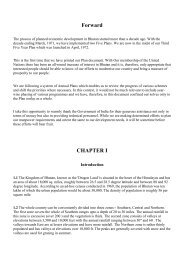- Page 1 and 2:
I. Inaugural Ceremony TRANSLATION O
- Page 3 and 4:
The National Assembly ratified seve
- Page 5 and 6:
allot. A brief curriculum vitae of
- Page 7 and 8:
Sonam Wangchuk from Zhemgang won th
- Page 9 and 10:
Bodo militants in the country pose
- Page 11 and 12:
Goendeys in the country continue to
- Page 13 and 14:
1. The military capability of the a
- Page 15 and 16:
ate is 4.5%, and the balance of pay
- Page 17 and 18:
of the Basochhu Hydropower Project
- Page 19 and 20:
3. The Department of Education has
- Page 21 and 22:
As Gross National Happiness places
- Page 23 and 24:
Since people-centred development li
- Page 25 and 26:
Recognizing the deep reverence that
- Page 27 and 28:
conference. This is an indication o
- Page 29 and 30:
safeguard the sovereignty of the co
- Page 31 and 32:
They also expressed their profound
- Page 33 and 34:
ooklet on the financial report of Y
- Page 35 and 36:
Nu.260 million was spent on purchas
- Page 37 and 38:
Nu.381 million increase in the budg
- Page 39 and 40:
would be incurred. Although the cur
- Page 41 and 42:
udget presentation by the Hon’ble
- Page 43 and 44:
The fact that the debt service rati
- Page 45 and 46:
the territories of Assam and Bengal
- Page 47 and 48:
Since many of the plan projects cou
- Page 49 and 50:
issue of the Thimphu-Phuntsholing h
- Page 51 and 52:
the Department should ensure that t
- Page 53 and 54:
Sarpang Dzongkhag. He extended the
- Page 55 and 56:
The Speaker underlined the signific
- Page 57 and 58:
Kuensel and the Bhutan Broadcasting
- Page 59 and 60:
The Hon’ble Minister for Health a
- Page 61 and 62:
A Royal Advisory Councillor and the
- Page 63 and 64:
The Speaker noted that the governme
- Page 65 and 66:
failed to resolve the problem, ther
- Page 67 and 68:
serious resentment and animosity be
- Page 69 and 70:
The NDFB militants are fighting the
- Page 71 and 72:
affected the security of the countr
- Page 73 and 74:
The ULFA delegation said that they
- Page 75 and 76:
again to find a solution to the pro
- Page 77 and 78:
led by the Home Minister and the UL
- Page 79 and 80:
epresent a government since they ar
- Page 81 and 82:
Bhutanese people. Last December, wi
- Page 83 and 84:
ii. Two rounds of Security Coordina
- Page 85 and 86:
undergone militia training and serv
- Page 87 and 88:
left but to resort to military acti
- Page 89 and 90:
shops. In such situations, the loca
- Page 91 and 92:
would be better to act in accordanc
- Page 93 and 94:
He informed the members that, under
- Page 95 and 96:
and working to this end without eve
- Page 97 and 98:
security of the nation is of the ut
- Page 99 and 100:
however, be in our interest to endo
- Page 101 and 102:
agreement signed with the Royal Gov
- Page 103 and 104:
there was no longer any conscriptio
- Page 105 and 106:
genuine volunteers should be forwar
- Page 107 and 108:
the time to make excuses regarding
- Page 109 and 110:
militia force, and after returning
- Page 111 and 112:
The people’s representatives of T
- Page 113 and 114:
They wondered where all the organiz
- Page 115 and 116:
faction which does not have camps i
- Page 117 and 118:
pressing on this issue, the problem
- Page 119 and 120:
informed the house the Lhengyel Zhu
- Page 121 and 122:
apprehended and brought to justice.
- Page 123 and 124:
The Foreign Minister informed the h
- Page 125 and 126:
this regard, the Royal Government w
- Page 127 and 128:
who left after committing terrorist
- Page 129 and 130:
and the agreement reached by Bhutan
- Page 131 and 132:
2. The hon’ble members are aware
- Page 133 and 134:
verification provides ample time an
- Page 135 and 136:
In his presentation on the issue, t
- Page 137 and 138: deliberately trying to delay the pa
- Page 139 and 140: obbery and destruction of service i
- Page 141 and 142: emain in the country. These people
- Page 143 and 144: The people in the camps in Nepal co
- Page 145 and 146: during the 14 th round, Bhutan had
- Page 147 and 148: abide by the resolutions of the Nat
- Page 149 and 150: However, it is most important that
- Page 151 and 152: effective treatment or vaccine, and
- Page 153 and 154: The Secretary also pointed out that
- Page 155 and 156: supervision and guidance. The Assem
- Page 157 and 158: local Forest Office. This takes abo
- Page 159 and 160: 4. To enhance sustainable use of fo
- Page 161 and 162: For conifer species, Nu.40 per tree
- Page 163 and 164: per truckload. Further, in order to
- Page 165 and 166: A Royal Advisory Councillor said th
- Page 167 and 168: workforce were reduced, the Bhutane
- Page 169 and 170: issue. Furthermore, the Cabinet has
- Page 171 and 172: numbering about 60,000 and coming t
- Page 173 and 174: proposing the issue of the expatria
- Page 175 and 176: Penden Cement Plants are Bhutanese.
- Page 177 and 178: the government offices take the nat
- Page 179 and 180: Punakha Chimi those people on whom
- Page 181 and 182: the competence of the Bhutanese in
- Page 183 and 184: are private sector candidates who r
- Page 185 and 186: aspects and those who are unable to
- Page 187: Jabmi. It would be beneficial if th
- Page 191 and 192: their decisions should be given due
- Page 193 and 194: material inducements to innocent vi
- Page 195 and 196: Another Chimi from Samtse Dzongkhag
- Page 197 and 198: It is the responsibility of the Gup
- Page 199 and 200: The Dorji Lopen of the Central Monk
- Page 201 and 202: The Minister expressed appreciation
- Page 203 and 204: Zhungtshog to direct the Government
- Page 205 and 206: The Minister pointed out that Part
- Page 207 and 208: Among many other provisions, the ac
- Page 209 and 210: flourishes. A strong and clear Chat
- Page 211 and 212: The Minister informed the Assembly
- Page 213 and 214: In Article 12 of Chapter 4 on page
- Page 215 and 216: Therefore, it is being submitted to
- Page 217 and 218: high taxes, and those with low inco
- Page 219 and 220: and in the interest of the poor, it
- Page 221 and 222: Therefore, it is important that PIT
- Page 223 and 224: session. Moreover, a revised copy o
- Page 225 and 226: The rule of law is a basic requirem
- Page 227 and 228: country depend upon the presence of
- Page 229 and 230: The National Assembly has the full
- Page 231 and 232: The Punakha Chimi also commented on
- Page 233 and 234: A lot of good experience has been g
- Page 235 and 236: meat in the country should decrease
- Page 237 and 238: therefore face lots of difficulties
- Page 239 and 240:
If two or three Chathrims rather th
- Page 241 and 242:
XX. Expression of Appreciation and
- Page 243 and 244:
tourists and other non-governmental
- Page 245 and 246:
people of different geogs to identi
- Page 247 and 248:
gained by the members of the DYT an
- Page 249 and 250:
of the Kurichu Hydro Power Project.
- Page 251 and 252:
institutes besides centers of Buddh
- Page 253 and 254:
that it has become a majestic icon
- Page 255 and 256:
promotion of the national language.
- Page 257 and 258:
those belonging to neighbouring Dzo
- Page 259 and 260:
secondly due to the concerted effor
- Page 261 and 262:
of a child, the Hon’ble chairman
- Page 263 and 264:
order to avoid problems related to
- Page 265 and 266:
Of the five killed, four were fores
- Page 267 and 268:
and sorrow at the incident. He said
- Page 269 and 270:
Among the dead in the recent incide
- Page 271 and 272:
greatly undermine the friendship an
- Page 273 and 274:
confidence and appreciation of the
- Page 275 and 276:
teachings of the Buddha to flourish
- Page 277 and 278:
opportunities and challenges associ
- Page 279 and 280:
3. Grants a. GoI Program Grants 800
- Page 281 and 282:
While there was a substantial incre
- Page 283 and 284:
would continue to monitor the size
- Page 285 and 286:
The Royal Government will, as annou
- Page 287 and 288:
power tariff for the rural consumer
- Page 289 and 290:
The domestic revenue forecast for t
- Page 291 and 292:
Customs duties on yarn have been ab
- Page 293 and 294:
The Royal Government continues to a
- Page 295 and 296:
The Royal Government is, therefore,
- Page 297 and 298:
The Ministry of Finance will study
- Page 299 and 300:
climate for private sector developm
- Page 301 and 302:
4. Gross International Millions of
- Page 303:
303


